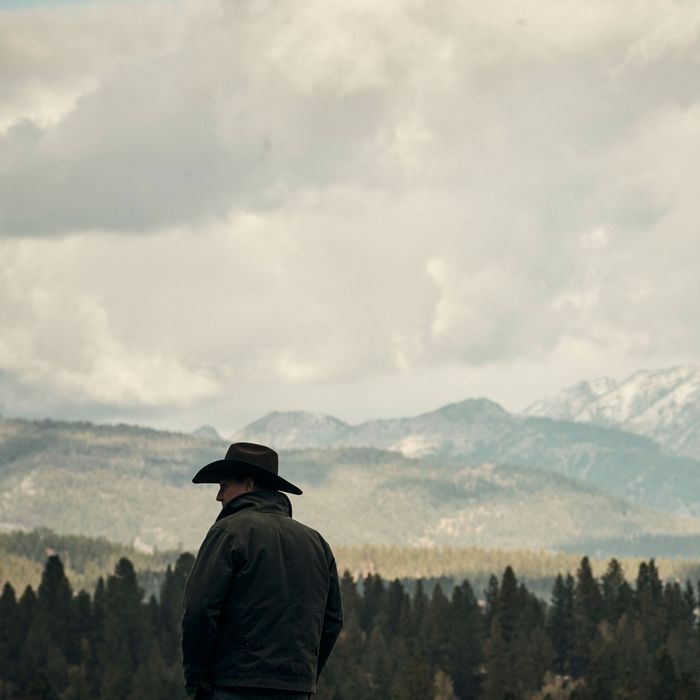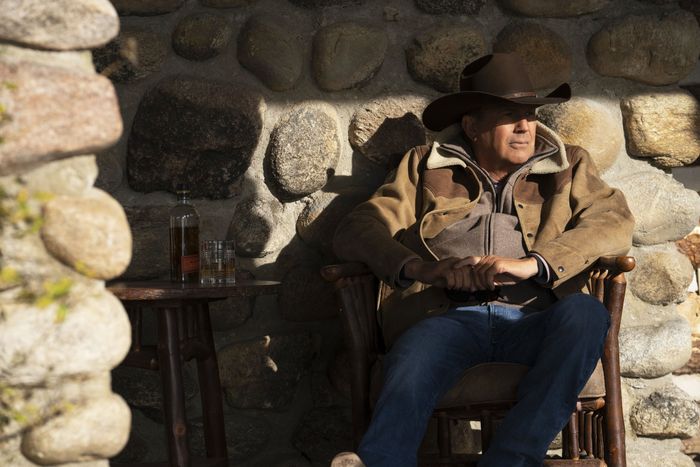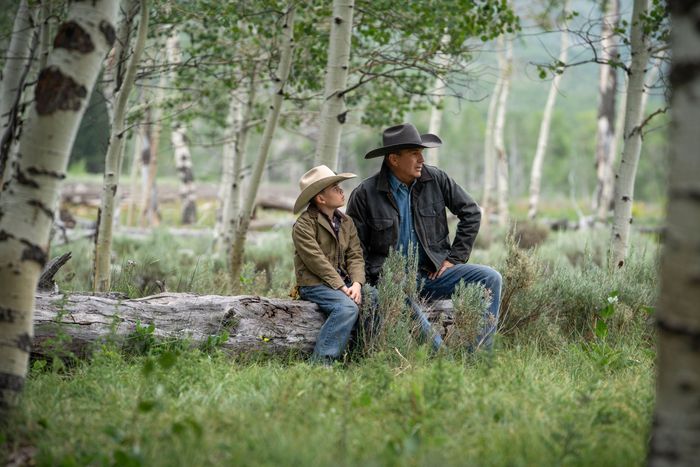
John Dutton has a lot of enemies. The patriarch protagonist of Yellowstone is a powerful rancher in Montana, played by Kevin Costner with a voice too rocky to be called “gravelly.” It is a bouldery voice, and when Dutton’s enemies confront him, Costner delivers his retorts in curt rumbles that sound like a cave collapsing. Like his father before him, Dutton is the owner of The Yellowstone, the largest ranch in Montana. And like most cable dramas, especially those from the long lineage of middle-aged men in prestige TV, Yellowstone is full of antagonists who seek to diminish Dutton’s power. They attack his men, and they undermine him financially. Their lackeys punch his guys, and Dutton’s guys fight back. Meanwhile, John Dutton’s three children tussle and maneuver for their father’s favor. In some ways, Yellowstone is much like any other wealth-and-corruption show on TV.
At the heart of Yellowstone, though, lies an ideology that separates it from the prestige-knockoff pack, a desperate and threatened appeal to American identity and white masculinity that makes the Paramount series palpably different from other family rivalry dramas like Billions or Succession. In its typical beats, it resembles those shows and other prestige projects — it mixes internecine family drama with larger-scale power plays, and like so many series of this genus, its central spoke is one sad, middle-aged white guy. But the typical generational drama on American TV is about power for power’s sake, and about the anxiety of the new generation living up to and overtaking those who came before. On Yellowstone, those beats come hand in hand with a more existential anxiety. John Dutton’s enemies aren’t just generic baddies who want what he’s got — if they were, he wouldn’t care so much if they beat him. The battles on Yellowstone are about the idea that one way of living is just better than the others. To be a rancher, or even better a cowboy, a real cowboy, is a purer, more authentic, better life. And it’s no coincidence that this show about the painful anxiety of that life being taken away is, in its third season, one of the most-watched dramas on cable.
For a show about a massive piece of land — and Dutton’s is big enough that it’s essentially a nation-state — there are really only two buildings on it that matter. The biggest one, the most conspicuous and outwardly impressive, is the Dutton lodge, a looming wood and river-stone mansion. It’s designed to intimidate inside and out, and its décor is a specific blend of wealth and American Westernness. Dutton’s enemies are often loathsome, soulless Silicon Valley investors, people who tend to prefer super-tall ceilings, modern starkness, enormous sheets of glass and high-gloss finishes. In contrast, Dutton’s lodge is a dark wood and crackling fireplace kind of place. There are stag heads on the wall, brass-studded leather chairs, and Pendleton patterns. The Duttons have a private chef, but they also all wear their cowboy boots inside the house. Plus, the chef’s name is Gator. It’s wealth, all right, but it’s filtered through a validating prism of style. It’s wealth, but it’s okay because the Duttons get what Montana is supposed to be.
The only other structure of any sustained importance on Yellowstone is on another part of Dutton’s ranch: the bunkhouse where all the ranch hands live. It’s cramped and unfussy, two or three rooms of a living space with a kitchen, a bathroom, and a room where half a dozen or more cowboys all sleep on twin-size bunks. The bunkhouse is full of plaid blankets and empty beer cans and hand-knotted rugs. It’s where characters with names like Lloyd and Colby and Walker spit and play drinking games and pass out before staggering up at dawn the next morning to move the herd down to a new pasture. The walls of the bunkhouse are plastered with torn-out magazine pictures of pretty women — not nudes, but chastely inviting, cheerfully smiling women. There’s smut and roughhousing in the bunkhouse, but it’s good, clean smut, and good, manly roughhousing. The bunkhouse is a tough place, and it’s also what Yellowstone sees as the best, truest place on earth.
The bunkhouse’s place in Yellowstone’s vision of American manliness begins to take shape in the first season storyline about Jimmy (Jefferson White), a trailer park kid in danger of being lost. Jimmy’s problem might be drugs or maybe weapons — Yellowstone’s not sure, and it doesn’t really care about the details. But it’s clear that Jimmy, a shrimpy, complaining kid who listens to rap and lives in squalor, is at a point of no return. When a concerned relative begs Dutton to take Jimmy in and reform him, Jimmy’s sent straight to the Yellowstone bunkhouse. He’s useless. He cannot ride a horse, he knows nothing about ranching, and while everyone else wears leather chaps and stiff boots, Jimmy’s in sneakers and oversize jeans. (Ninety percent of the characters on Yellowstone are white, but Jimmy’s bunkmates’ derision of his lowriders smacks of coded racism.) Gradually Jimmy learns how to ride, to respect his elders, to inseminate a cow and stay on a bucking bull and wear a wide-brimmed hat. By season three, he’s still a knucklehead, but he’s accepted. The kind of America Jimmy lived in before was small, impoverished, lazy, and hoping for a handout. Real work and the bunkhouse grant Jimmy dignity.
A similar arc repeats again a season later, when John Dutton’s son Jamie (Wes Bentley) betrays the family by disclosing their secrets to the press. John sends him to the bunkhouse, making him the house’s low man, responsible for all the most grueling, thankless chores. As with Jimmy, the bunkhouse is Jamie’s path to redemption.
There are a handful of Black ranch hands in the bunkhouse, too, and there have been a few women over the show’s three seasons. They’re always on the margins, but Yellowstone is happy to make room for them in its meritocratic vision of American value. There’s plenty of space for anyone who can do the work, anyone who will willingly shape themselves into the cowboys the Yellowstone needs and leave anything else behind. The bunkhouse is the way, the truth, and the light. It will teach you how to be strong and to have worth. It’s a supremely masculine, American, whiteness-inflected ethos of how Yellowstone yearns for the world to work.
That ethos is so powerful that members of the Yellowstone bunkhouse wear it on their skin. The ranch is staffed by career cowboys, but also by the kinds of runaways, ex-cons, and social outcasts who land there as a last resort. They’re inducted into the Yellowstone world and they are never allowed to leave: Rip, the ridiculously named, broad-shouldered ox of a man who runs the Yellowstone bunkhouse, literally brands them with the Yellowstone Y. Rip is branded with it, too. Jimmy gets the brand in the first episode of the series, and he is appalled by it right up until the bunkhouse’s culture teaches him to begrudgingly respect it. I was appalled by it as a viewer, and I was horrified again when newer ranch hands willingly accepted the brand near the end of season three. But Yellowstone is almost uncannily good at taking that horror and twisting it into something like honor. The mountainous horizons are too big, too sublime to worry about a brand scarred into someone’s skin. If the brand is the cost for living this life, Yellowstone suggests it’s worth it.
The ideology of the bunkhouse is sparklingly pure, simple, and unforgiving. Monied urban types are effete namby-pambies who don’t value the good things: Dirt. Cows. Empty horizons. Silence. Those people are less sweaty, less callused, less worthy. And yet I spent the first several episodes of Yellowstone’s first season with the impression that the show’s politics were strangely muddled. If the bunkhouse is the only way to live, John Dutton’s looming, luxurious lodge is a problem for Dutton’s soul. It makes him dirty — not the good dirt of a long day herding cattle, but the bad dirt of underhanded stock deals and blackmail and state-level political maneuvering.
Yellowstone knows this. Dutton’s daughter, Beth (Kelly Reilly), is the family’s emissary into the world of loathsome corporate America, but she’s also the family truth teller. Even as she works to destroy the ranch’s enemies, Beth spits venom at her brothers and resents her father. “Let’s just continue with the illusion that we’re one big happy family,” she tells Dutton at the dinner table. “That’s exactly what it is,” he says. “That’s what it was,” she corrects him. “I don’t know what the fuck to call it anymore.”
For as clear and incontrovertible as the bunkhouse politics are, the politics of the Yellowstone’s lodge are slippery, changeable, and equivocating. More often than not, Yellowstone truly can’t seem to decide whether John Dutton is the hero of his own story. He has alienated his children, asks his ranch hands to commit serious, violent crimes on the ranch’s behalf, and regularly chooses monstrous means to enact his desired ends. When Beth whispers about how damaged they all are, we are supposed to believe her. When the bunkhouse’s Cassandra equivalent, a drifter-bard named Walker (Ryan Bingham), says that “there’s something evil about this place,” we’re supposed to believe him, too.
And yet, because of his absolute refusal to give in to modernity, to cede even an inch of his ungodly amount of raw Montana wilderness, Yellowstone’s sympathies lie with John Dutton. He is beset on all sides — by financiers with more money, by his unfaithful children, by the fact that America is abandoning the way of life he so deeply treasures. Even though he’s become a creature of the lodge, John Dutton knows and respects what it is to be a bunkhouse guy. He may be an imperfect guardian of the manifest destiny he stands for, but from Yellowstone’s perspective, he’s also the only guardian left. How can it not root for him?
It is such a persuasive, beguiling vision of white American masculinity — ownership, mastery, freedom from interference and surveillance, loyalty at all costs, physical strength, and land. Dutton’s bone-deep anxiety about losing any of his property is because his worldview makes no sense without it, and in the hierarchy of Yellowstone, Dutton’s worldview wins over anything else. It is the deepest foundation of the show’s idea of Americanness. It is also the thing Yellowstone examines least. The idea that being a cowboy is better than anything else is a bedrock the show has no interest in reconsidering. It’s obviously a lost cause; Dutton accepts that he may well be the last generation to keep the ranch alive. But the fact that it’s threatened only casts his cause in a greater and more tragically noble light.
There’s only one element of Yellowstone that acts as a prevailing wind, one contrary voice that chimes in occasionally to ask if perhaps, just perhaps, John Dutton’s way of life is not the physical manifestation of American greatness. It’s not just real-estate developers and hedge funds who want to destroy Dutton’s ranch — there’s also Thomas Rainwater (Gil Birmingham), the chief of the show’s Native American reservation. He wants land from the Dutton ranch to build a new casino on, but that casino is just a tool to amass resources so he can buy out the whole valley. Rainwater wants to return the land to the fenceless, cattleless, Native-owned state it once was. By Yellowstone’s own hierarchies of value, Rainwater’s claim to the family’s property should be even stronger than Dutton’s — it’s older, and his imagined use for the land is even more honorable, even more pure.
But Dutton ignores him. After some Yellowstone cattle wander onto reservation land and Rainwater’s people won’t return them, Dutton tells him, “If you act like a thief, Thomas, I will treat you like one.” “How can you stand there on a ranch the size of Rhode Island and accuse me of theft?” Rainwater responds. Dutton has no answer, and Yellowstone doesn’t either. Instead, Rainwater gets classified as another of Dutton’s many adversaries — as an opposition to the things that make John Dutton who he is, an otherness to Dutton’s whiteness. Yellowstone and John Dutton have no answer for Thomas Rainwater because there isn’t one, and the fact that the show marches ahead without addressing it speaks to the hollowness of its American vision more potently than any of the constant hand-wringing about whether Dutton’s ends justify his means. The only response Yellowstone can muster is Tate (Brecken Merrill), Dutton’s grandson. Tate’s mother is Native American and was born on the res, and now she and Tate live with the Duttons at the lodge. Yellowstone raises the question of Native sovereignty, but the most it’s willing to do is assimilate Native identity into the show’s moral code. Dutton makes Tate the ranch’s heir presumptive, and he gives him a horse to teach him about responsibility.
For a show about American exceptionalism, Yellowstone’s is a stunningly insular world. It feels like a contradiction for a show so obsessed with bigness, but in its heart, Yellowstone is a show about the inescapable smallness of feeling aggrieved and besieged. It has no interest in explicitly probing its blind spots, in admitting that perhaps John Dutton has enemies because he has placed himself in opposition to everyone, or that perhaps it’s not good for one man to own half a million acres. It’s a show about masculine fragility, and the Duttons are the only ones who haven’t yet realized it.
When I fell into Yellowstone’s world, I started as a skeptic. Its worldview is so blunt, and the writing rarely does much to provide nuance around the edges. These cowboys and the blinkered way they live out of time is so laughable sometimes — in an early episode, one of the Duttons stares, baffled and disgusted, at a barista preparing a pour-over in the town’s new coffee shop. When I step back from Yellowstone, I get a little furious: John Dutton is so blind to his own privilege, so myopic, so preoccupied with ownership that everyone on his land — cattle and people alike — must literally wear his brand. How dare he? When I’m watching it, though, I feel Dutton’s anxiety. I look past him at the unbelievable landscape of his ranch, and I see why he has such a hard time imagining any other world. The more I watched these characters cling obsessively to something that in their hearts they know they cannot keep, the more I felt like Yellowstone is communicating something no other current TV show does this well. Dutton’s anxious, and he’s right to be. The outside world is a threat to the things he holds most dear. But he’s not capable of seeing adaptation as strength, so the only thing he can do is feel more and more terrified and bury his head in the sand.
Early in season three, Dutton and the ranch hands are building a summer encampment out on a distant pasture, and after unloading the chuck wagon and pitching all the tents, Dutton sits down to enjoy the vista. He owns all of it. But his phone rings and he answers, climbing high onto a nearby outcrop to try to get better signal, annoyed that the call is ruining this perfect insularity and frustrated when the call gets dropped. “Hey,” he says to the ranch hands, gesturing toward where he’d been wandering to get better reception. “Everything moves up here. I want everything up here.” The ranch hands shrug, and then dismantle the entire camp to move it a hundred yards away. “Is this a better camp?” Tate asks him, once it’s all set up again. “Let’s see,” Dutton says, looking at his phone. There’s no signal. Nothing about the world has changed, but Dutton’s just figured out how to ignore it a little longer. “Yep,” says Dutton. “This camp is much better.”




